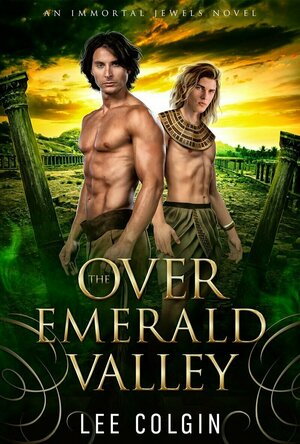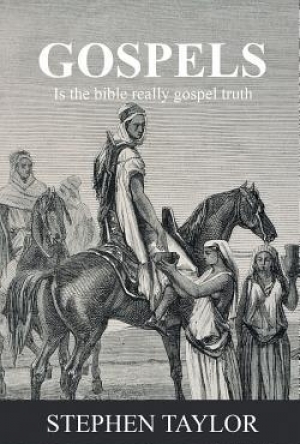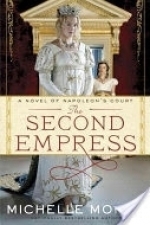
The Second Empress: A Novel of Napoleon's Court
Book
After the bloody French Revolution, Emperor Napoleon’s power is absolute. When Marie-Louise, the...
Merissa (13668 KP) rated Over the Emerald Valley (Immortal Jewels) by Lee Colgin in Books
May 5, 2022 (Updated Jun 20, 2023)
This book is set in ancient Egypt where Solon has been sent on a mission to visit some remote emerald mines where the Pharaoh thinks he is being short-changed. Once there, he is 'gifted' with Temaj, a concubine who may or may not be there to spy on him. He resists the attraction, but not for too long. Temaj has had a rough life but is now making the best of it. Will he help Solon rock the boat, or will he decide he is too comfortable?
I liked how Temaj was able to draw Solon out of himself, although I found his bratty attitude a bit much at times. I know it was his character but it didn't seem to fit with his role all of the time. Abasi must have been a very laid-back owner to allow him to speak in such ways in public. Temaj was also able to make Solon see things differently, and I loved his comparisons as he tried to make Solon understand his point of view.
The supporting characters were wonderful and I couldn't help a pang of sadness with Temaj at the thought of not seeing Seli or Met again. And Solon with Neku. I am hoping we will see more of Solon and Temaj's life with Eshe in different books.
Overall, this was a very good read that kept my attention to the end. Recommended by me.
** same worded review will appear elsewhere **
* A copy of this book was provided to me with no requirements for a review. I voluntarily read this book, and the comments here are my honest opinion. *
Merissa
Archaeolibrarian - I Dig Good Books!
May 3, 2022
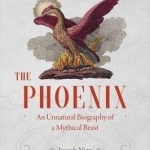
The Phoenix: An Unnatural Biography of a Mythical Beast
Book
Arising triumphantly from the ashes of its predecessor, the phoenix has been an enduring symbol of...

Plants vs. Zombies™ 2
Entertainment and Games
App
"As beautifully presented as it is absorbing to play: 8.7 out of 10." – ign.com Play the...

GSVExplorer
Navigation and Travel
App
Search and view Google street view from a visible map region Features - Tap on map view to search...
Gareth von Kallenbach (980 KP) rated Mr. Peabody & Sherman (2014) in Movies
Aug 6, 2019
1950s-1960s legendary kids cartoon "The Rocky and Bullwinkle Show." Mr.
Peabody (Ty Burell), a Nobel prize winning brainiac canine, whose
intelligence is beyond that of any human being; there is nothing this
Beagle cannot do. He was able to put his brilliant mind to use and adopt
a young boy named Sherman (Max Charles) and he also invents a time
travelling machine he calls the WABAC (pronounced way-back). He uses the
WABAC as a teaching tool by travelling back in time with Sherman to
experience some of the most famous moments in history.
On Sherman's first day school, he finds that some of the history lessons
being taught in school were not accurate to how the events actually took
place. Remember, he traveled in time and witnessed it all first hand.
Sherman finds himself clashing with his classmate Penny (Ariel Winter),
who spends most of her time teasing and bullying Sherman for 'knowing too
much' and for being raised by a dog. In an attempt to bring peace among
Sherman's classmates and to also avoid the impending threat from child
services who would like nothing more than to prove that a dog does not have
the right to raise human child, Mr. Peabody invites Penny and her parents
over to their home for dinner. Sherman tries to impress Penny by breaking
Mr. Peabody's rules and introduces Penny to the WABAC. Nothing good comes
of two kids travelling in time and disrupting the space time continuum.
Enter Mr. Peabody, who uses the WABAC to try and rectify the disruptions
that were caused by Penny and Sherman's adventure through time.
This movie is not the story of "man's best friend!" It is geared more
towards the father-son relationship. A very likeable film that brings us
back to some significant moments in history, such as Leonardo DaVinci's
painting of the Mona Lisa, the Trojan War, the time when King Tut ruled
Ancient Egypt, and the French Revolution. In true Dreamwork fashion, there
was just the perfect of amount of humor for kids and adults alike to
enjoy. What sets this movie apart from others is its ability to embrace
education as an adventure and how it challenges the 'traditional' family
stereotype and that love can be found in all creatures and at any time.
4 out of 5 stars.
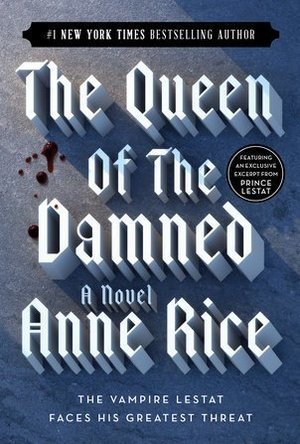
The Queen of the Damned (The Vampire Chronicles, #3)
Book
In 1976, a uniquely seductive world of vampires was unveiled in the now-classic Interview with the...
LeftSideCut (3776 KP) rated X-Men: Apocalypse (2016) in Movies
Aug 19, 2019 (Updated Oct 25, 2019)
I'm going to get straight to the main flaw with this one - I'm not sure how someone can really mess up Apocalypse so bad - he is a great X-Men villain. I remember watching the cartoon as a kid, being enamoured whenever Apocalypse turned up. The first mutant, practically a god, terrifying voice etc.
The Age of Apocalypse story arc is also a great comic - one where we see just how dangerous Apocalypse can be.
But instead of this classic villain, we get, well whatever the hell this is.
Oscar Isaac is give or take in other films I've seen him in, he just sort of exists to me, but I'm sure he did the best he could with what he was given.
But the character we're presented with in X-Men: Apocalypse is a mutant that isn't particularly terrifying, whose motives aren't very clear, and who speaks in a goddam normal human voice for the entire movie.
He looks, ok I guess, a little Ivan Ooze-ish at times, and there is a (very) brief moment where his voice goes all demonic and his eyes turn white, which offers a tiny glimpse of what could have been.
Elsewhere, the still awesome Michael Fassbender is relegated to a sidekick character, new cast members such as Psylocke, Angel, and Storm are there just to strike poses to edgy rock music, and Quicksilver gets a re hash of his great scene from DOFP that just doesn't quite hit the mark this time round.
The introduction of Sophie Turner as Jean Grey is fine, and it's nice to see a young Cyclops, Nightcrawler etc, but they're not given too much to do. It all just feels like one big wasted opportunity.
The film would have been much better and ballsier had it ended with Apocalypse winning, and ushering a full on Age of Apocalypse scenario for a sequel, but instead, he is dispatched with not too much trouble, as the writers poorly shoehorn in a segue for Dark Phoenix (for the second time in this franchise)
It's not all bad, there are times where I felt I was watching the cartoon come to life. The opening scene in ancient Egypt was pretty fun, and I actually quite enjoyed the brief Wolverine scene - those few minutes were way more entertaining to me than the entirety of X-Men Origins: Wolverine.
Overall though, this one had me wanting the rights to return to Marvel Studios.
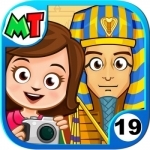
My Town : Museum
Games and Education
App
At My Town's Museum, there is something fun and exciting in every room and something to play with...
Is the Bible really gospel truth? This is the question the honourable, academic Robert Babcock aims to find out on his quest to find the earliest copies of the gospels in order to prove the reliability of the story of Jesus as recounted in the King James Bible. However, this is not the key focus of Stephen Taylor’s fictional novel, Gospels. The main character is the perfidious John Campbell-John, a rogue, imposter and swindler who flees 19th-century England in an attempt to escape from his debts.
John meets the magnanimous Robert in Venice and, despite being polar opposites, become firm friends. After being honest for the first time in his life, admitting to owing thousands of pounds in gambling debts, Robert offers John the opportunity to accompany him on his quest through the deserts of Egypt. John accepts and the pair finds themselves on an adventure of discovery and personal redemption.
John and Robert make an unlikely but excellent team. Robert’s knowledge of the Bible and ancient history is vital, however, John’s propensity for falsehoods and cunningness gets them out of a few scrapes and tricky situations. Nonetheless, it is difficult for John to give up his old ways and his insular behaviour threatens to get them in more trouble.
Fortunately, Robert’s humility begins to influence the young scoundrel, as does his penchant for historical artefacts. As the story progresses, John begins to leave his past behind and becomes interested in Robert’s work, learning new things about Egyptian culture and the origins of the Bible. However, when a new gospel comes to light that threatens the whole of Christianity, Robert does not know what to do; and only John can give him counsel.
John Campbell-John is a character that the author introduced in a previous book. However, the timelines are not sequential, therefore Gospels is a stand-alone novel. The time frame for this book needed to be set in 1835 to correspond with historical truths. Although Robert’s discovery of a Gospel of Thaddeus Jude is an invention of the author, the quest itself is based on the journeys of three 19th-century Bible hunters. Stephen Taylor has conducted an enormous amount of research, including the biographies of Robert Curzon, Constantin von Tischendorf and Émile Amélineau who, on separate occasions, sought the same knowledge as the fictional Robert Babcock.
Despite being titled Gospels, the novel, for the most part, focuses on John Campbell-John and his wicked ways. Through a first-person narrative, John explains his past, his betrayal of a friend, and his addiction to gambling. Initially, he has no qualms about his behaviour and acts only for himself and his selfish greed. Whilst Robert goes in search of knowledge, John goes on a journey of redemption, coming to terms with his previous wrongdoings. However, acknowledging these faults is not enough, he needs to turn away from these roguish ways.
It is disappointing that the narrative does not focus more on the gospels, both real and imagined. There was enormous scope for an in-depth look at the life of Jesus and the inconsistencies in the Bible. The fictitious Gospel of Thaddeus Jude evokes a similar reaction in Robert as the Non-Canonical Gospel of Thomas found in the 19th-century had on many devout Christians. There was so much potential with this direction of thought, however, the author passes over it in preference to the life of John Campbell-John.
Slow to begin but increasingly interesting as it progresses, Gospels is a book of many themes. History, both 19th-century and ancient; religion, although not a Christian story; and achievement and absolution combine together to produce a unique tale that takes the reader from the back alleys of London to the River Nile and the deserts of Sinai. A subtle clue in the prologue keeps readers alert as they await the conclusion of the adventure – an ending that ambiguously reveals whether John moves on from the follies of his past.
